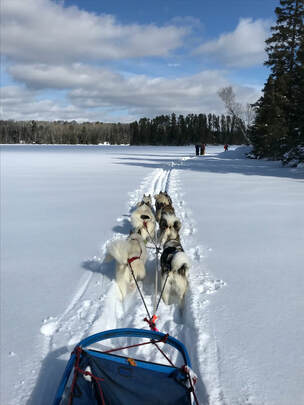 When the chill of winter arrives, you can either run the other way or embrace it. Having spent many years enjoying the outdoors in all seasons and weather, I aim for the latter and in this spirit spent the past week on a dog sledding and Nordic skiing camping trip in northern Minnesota. With temperatures well below zero and in the single digits, but also in the balmy teens, needs focus in on the basics: food and sufficient firewood with which to boil water and cook, the right clothing for staying warm and dry, and shelter-- in this case a bivvy sack for sleeping under the stars. The Boundary Waters are remote area that feels all the more remote in the winter. An area north of the "Laurentian Divide", raindrops and snow melt end up in the Arctic Ocean, rather than the Atlantic, Gulf of Mexico, or Pacific. Led by the fabulous outfitter Wintergreen, founded by Paul Schurke, a noted polar explorer whom we dubbed "Eighth Wonder of the Word" for his endurance, resilience, and intrepidness, the trip entailed traversing blissful miles of frozen lakes and boreal forests filled with black spruce and balsam furs, birch, and aspen. Along the way was evidence of local creatures -- snow tracks left by wolves, deer, moose, and snowshoe hares -- and continual admiration for our sled dogs, true professionals, each full of personality and eager to pull, dragging sleds carrying our heavy loads of equipment (with skiers breaking trail in the deeper snow). Inuit dogs are the domesticated breed closest to wolf; their wolfish selves emerging in their occasional canine-bearing snarls directed at one another to assert dominance. At the same time they respond like puppies when interacting with humans, basking in attention and rolling onto their backs for a stomach rub. In the remote frozen region, one's reliance on others becomes all the more apparent, an interesting irony in that one can feel most connected to other people in a wilderness environment. Arriving into the evening's campsite, we spread out to perform tasks assumed almost instinctually: gathering firewood, digging into the lake ice to create a water hole, setting up a fire pit on the ice, with a layer of logs underlying metal fire trays to separate the fire and ice. We cleared areas to set up our bivvy sacks, digging into the snow to shelter the bags from wind. And we tending to the sled dogs, transitioning them from the sled to hooking them up one by one on a line set up along the trees, removing their harnesses, and preparing their food. While the Boundary Waters are a world away from New York City, there was much that was elemental on the trip that translated to my urban home. If neighboring wolves and our sled dogs are pack animals, so too we humans form packs, finding community and interdependencies among one another, and even asserting--or encountering others asserting--alpha dominance. My return to New York City from the Great North Woods felt uncanny. The taxi that whisked me from the airport to home seemed confining and way to warm inside. To the driver's chagrin, I opened the window to feel the snap of cold and the breeze -- to breathe again -- and could almost imagine that I was being transported by dog sled across a frozen lake, rather than in a taxi on the crowded Grand Central Parkway. On arriving home, I took pleasure in having a warm bed and modern conveniences: indoor plumbing and a stove that didn't require gathering abundant firewood. At the same time that I appreciated the significant labor saved by these inventions, they also made me feel disconnected from the elemental features they deliver: fire at the turn of a knob; water at the turn of a handle. No hours spent scouring an island for firewood, with coordinated efforts to chop and saw fallen trees, drag them many yards to our fire pit and sort the wood into fire-starter twigs and birch bark, thicker branches, and logs. No continual chinking into the 2-foot lake ice to reach water. It all seemed too easy, and I pondered for a while what is lost when we receive such abundant resources with ease -- recognizing too how much is gained by not having to focus every day on basic survival needs. Having unpacked and run a load of laundry (more modern convenience magic!), I proceeded outside, ambling down Lexington Avenue, with each step sensing the breeze along the avenue as it touched the bare skin of my face and noting it felt as constant as the breeze encountered while traversing frozen lakes and forests on skis and dog sled. By some premonition, I felt a presence that impelled me to look up. And there, aloft on 73rd and Lex, was a Peregrine falcon, drifting on a thermal, a touch of wild in the metropolis, and a reminder of the wildness that persists if we just know where to look.
1 Comment
|
About this Blog
Hi! I'm Nancy Kopans, founder of Urban Edge Forest Therapy. Join me on an adventure to discover creative ways to connect with nature in your daily life, ways that are inspired by urban surroundings that can reveal unexpected beauty, with the potential to ignite a sense of wonder. Archives
April 2023
Categories
All
|

 RSS Feed
RSS Feed